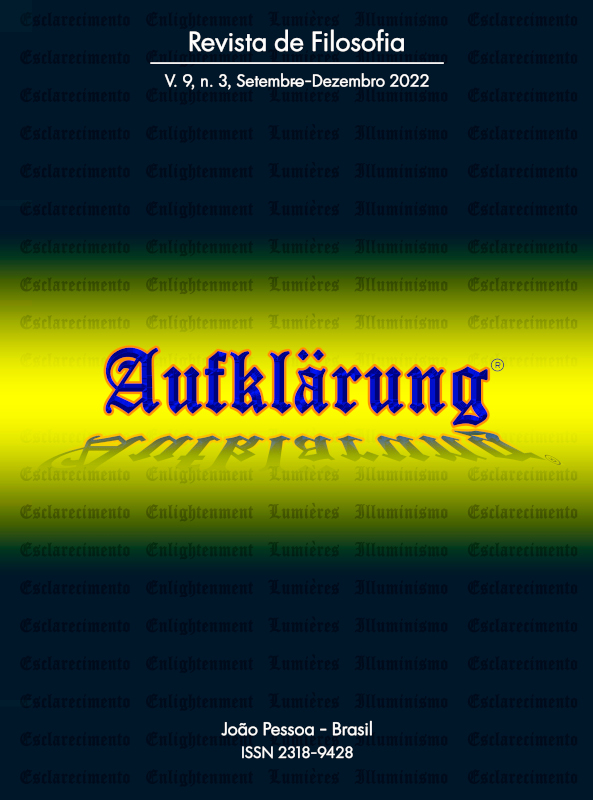Intentionality and constitution of meaning: Umwelterlebnis as an intentional structure of philosophy without a transcendental subject
DOI:
https://doi.org/10.18012/arf.v9i3.63882Keywords:
intentionality, phenomenology, constitution, meaningAbstract
I argue that the concept of Umwelterlebnis in Heidegger's 1919 text The idea of philosophy and the problem of worldview, concerns the intentional structure of a philosophy without a transcendental subject. I argue, however, that the model of this intentional structure involves the author in the problem of the constitution of meaning as in the project of phenomenology as an original science.
Downloads
References
BARROSO, G.L S. A constituição de sentido como acontecimento: Heidegger e a transformação da fenomenologia In: Griot: Revista de Filosofia, – Número I – V.02,
, pp. 17-38;
CROWELL, G.S. Husserl, Heidegger, and the Space of Meaning: Paths Toward Transcendental Phenomenology. Studies in Phenomenology and Existential Philosophy.
Northwestern University Press, 2001;
DRUMMOND, J. J. Historical Dictionary of Husserl's Philosophy. Scarecrow Press, 2007;
FINK, E. Proximité et distance. Essais et conférences phénoménologiques. Tradução do alemão par Jean Kessler. Ed. Jerome Millon, Grenoble,1994;
HEIDEGGER, M. Gesamtausgabe: 56/57 Zur Bestimmung der Philosophie (Sommersemester 1919). Frankfurt am Main:Vittorio Klostermann, 1999;
HEIDEGGER, M. GA 20 - Prolegomena zur Geschichte des Zeitbegriffs (Sommersemester 1925). Frankfurt am Main: Vittorio Klostermann, 1994;
HEIDEGGER, M. La idea de la filosofía y el problema de la concepción del mundo. Trad. Jesús Adrian Escudero, Barcelona: Herder, 2005;
HEIDEGGER, M. Prolegomenos para una Historia Del Concepto de Tiempo.Trad. Jaime Aspiunza. Madrid: Alianza, 2006;
HUSSERL, E. Investigações Lógicas - Vol. 2 Parte 1. Trad. Pedro Alves e Carlos Morujão. Rio de Janeiro: Forense Universitária, 2012;
HUSSERL, E. Investigações lógicas - Sexta investigação. Coleção Os Pensadores. Trad.
Zeljko Loparic e Andréa Loparic. São Paulo: Ed. Nova Cultural, 2000;
HUSSERL, E . Ideias para uma fenomenologia pura e para uma filosofia fenomenológica.
Introdução geral à fenomenologia pura. Trad. Marcio Suzuki. São Paulo: Ed. Ideias e
Letras, 2006;
HUSSERL, E. Ideas relativas a una fenomenología pura y una filosofía fenomenológica.
Libro segundo: Investigaciones fenomenológicas sobre la constitución. Trad. Antonio
Zirión México: Universidad Nacional Autónoma de México, 1997;
HUSSERL, E. A ideia da fenomenologia. Trad. Artur Morão. Edições 70, Lisboa, 2016;
HUSSERL, E. Notes sur Heidegger. Trad. Jean-François Courtine. Paris: Les éditions de
minuit, 1993;
MERLEAU-PONTY, M. Fenomenologia da percepção. Trad. Carlos Alberto Ribeiro de Moura. 2.ed. São Paulo: Martins Fontes, 1999;
MOURA, C.A. O nascimento do conceito de fenômeno In: Phainomenon, nº18-19, Lisboa, pp.41-52, 2009;
ONATE, A.M. O lugar do transcendental In Rev. Filos., v. 19, n. 24, pp. 131-145, Jan./jun. 2007;
RODRÍGUEZ, R. La transformación hermenéutica de la fenomenología. Madrid: Tecnos, 1997;
TADDEI, P.M. Verdade e identificação: a elucidação fenomenológica do conhecimento
em Husserl In: Revista Filosofia Capital, Brasília, vol. 7, n. 14, p. 100-105, jan/2012;
SOKOLOWSKI, R. Introdução à Fenomenologia. Trad. Alfredo de Oliveira Moraes. 4ª
Edição. São Paulo: Edições Loyola, 2014.
Additional Files
Published
How to Cite
Issue
Section
License

This work is licensed under a Creative Commons Attribution 4.0 International License.
Journal general policy
1.This journal works under a Creative Commons License aplied to online journals. That icence can be read in the following link: Creative Commons Attribution 4.0 International (CC BY 4.0).
2.Accordingly to this License, a)the journal declares that authors hold the copyright of their articles without restrictions, and they can archieve them as post-print elsewhere. b)the journal allow the author(s) to retain publishing rights without restrictions.
Metadata Policy for information describing items in the repository
1. Anyone may access the metadata free of charge at anytime.
2.The metadata may be re-used in any medium without prior permission, even commercial purposes provided the OAI Identifier or a link to the original metadata record are given, under the terms of a CC BY license refered for the Journal.







































